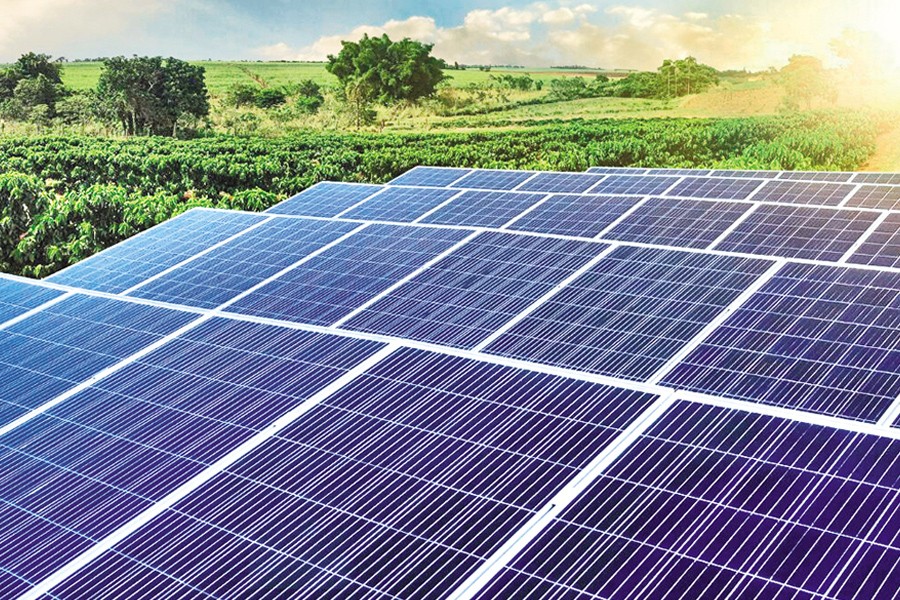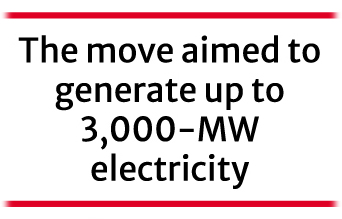NAT’L ROOFTOP SOLAR PANEL IMPLEMENTATION GUIDELINE UNVEILED
Govt to fund installation of rooftop solar at all state-owned buildings

Published :
Updated :

The government will provide funds from the public exchequer for setting up solar panels on the rooftop of all state-owned buildings, aiming to generate some 2,000-megawatt to-3,000-MW electricity.
However, the state-owned entities, which have their own income, will have to fund installation of solar systems on their building rooftops from their own earnings, the National Rooftop Solar Implementation Guidelines revealed.
According to the Renewable Energy Policy 2025, the government has set a target of meeting 20 per cent of the total electricity demand from renewable sources by 2030 and 30 per cent by 2040.
Presently, only 5.6 per cent (1,563 MW) of the country's total electricity is generated from renewable sources. On the other hand, about 56 per cent of the country's electricity is generated by using natural gas, the reserves of which are rapidly decreasing.
In this situation, the Power Division has formulated a "National Rooftop Solar Programme" to ensure energy security and prioritise renewable energy, the guidelines say.
The programme got approval of the Advisory Council in June, in which it targeted generation of 2000 MW to 3000 MW of electricity across the country, using the rooftops of government-owned offices, hospitals, and educational institutions.
Under the initiative, all the government entities would install solar panels on the roofs of their respective buildings with funds to be provided by the government, officials said.
Each department will accurately measure the roof area of their own buildings under their jurisdiction and apply to the electricity distribution companies seeking permission for setting up solar panels.
After submitting the initial application, the concerned electricity distribution company will review the technical aspects and issue its approval within seven days.
The departments, considering the durability of their buildings, will send the estimated cost to their respective ministries for getting allocation of funds, they said, adding that each ministries/departments will calculate their total fund requirements and place those before the Power Division.
Later, the Power Division will review the proposals to be received from the ministries through a scrutiny committee and send them to the Finance Division with recommendations for allocating the required funds.
The Finance Division will allocate funds directly to the relevant ministries/departments, based on the recommendations of the Power Division.
Each of the ministries concerned will then distribute the allocated funds among the entities according to their needs. After receiving such allocation from the ministry, the organisations concerned will invite tenders for installation of rooftop solar systems, the guidelines say.
As per the Net Metering Guidelines-2025, a customer is able to generate electricity from renewable energy sources not more than their permitted load. The guidelines asked to strictly maintain quality and standards while purchasing equipment for installing rooftop solar systems.
In the case of educational institutions and healthcare facilities, they can generate electricity based on the capacity of their building roofs.
The electricity distribution companies will pay the bill by calculating the organisations' own generated and consumed electricity. Thus, the electricity bills of all these facilities will be saved.
Such initiatives will be implemented through four models: Utility
Such initiatives will be implemented through four models: Utility OpEx Model, Public-Private Investment Sharing (PPIS) Model, Third Party OpEx Model, and General OpEx Model, the guidelines revealed.
Under the Utility OpEx Model, the electricity distribution companies will make the investment and install the rooftop solar system themselves.
All maintenance and preservation of the solar system will be under the supervision of the distribution companies.
There will be no financial expenditure on schools/colleges/madrasas/polytechnic institutes/hospitals/medical colleges/other institutions in implementing this model.
Under the Public-Private Investment Sharing (PPIS) Model the electricity distribution companies, following the proper rules and regulations, will jointly invest for setting up rooftop solar panels.
All expenses, including those of maintenance and preservation of the solar system, will be borne from the joint investment as per the agreement.
Under the Third Party OpEx Model a solar system can be installed on the roof of a school/college/madrasa/polytechnic institute/hospital/medical college/other institution with funding from a private investor by maintaining the standards of the distribution network of the electricity distribution companies.
To install the solar system, the electricity distribution companies will select a private investor after considering the electricity tariff rate through an open bidding process in line with the Renewable Energy Policy-2025 and PPR (Public Procurement Reform)-2008.
Under the General OpEx Model, solar panels can be installed on the roofs of all government educational institutions/health facilities through single or combined tenders.
Institutions will be able to generate electricity from rooftop solar systems individually or through joint tenders according to the capacity of their roofs. There will be no financial cost for educational institutions/health facilities in implementing this initiative.
The relevant investor will supply electricity to the educational institution/health facility at a price lower than the bulk electricity rate of the concerned electricity distribution companies.
Stakeholders have welcomed the government move to install rooftop solar at all the state-owned buildings.
Dipal C Barua, former president of Bangladesh Solar and Renewable Energy Association (BSREA), told the FE that the initiative would expand scope to generate clean energy in the country and also help lower greenhouse emission.
"The guidelines have kept an option of involving private sector developers in the installations of the rooftop solar panels. This is a very welcome move," he said.
syful-islam@outlook.com


 For all latest news, follow The Financial Express Google News channel.
For all latest news, follow The Financial Express Google News channel.